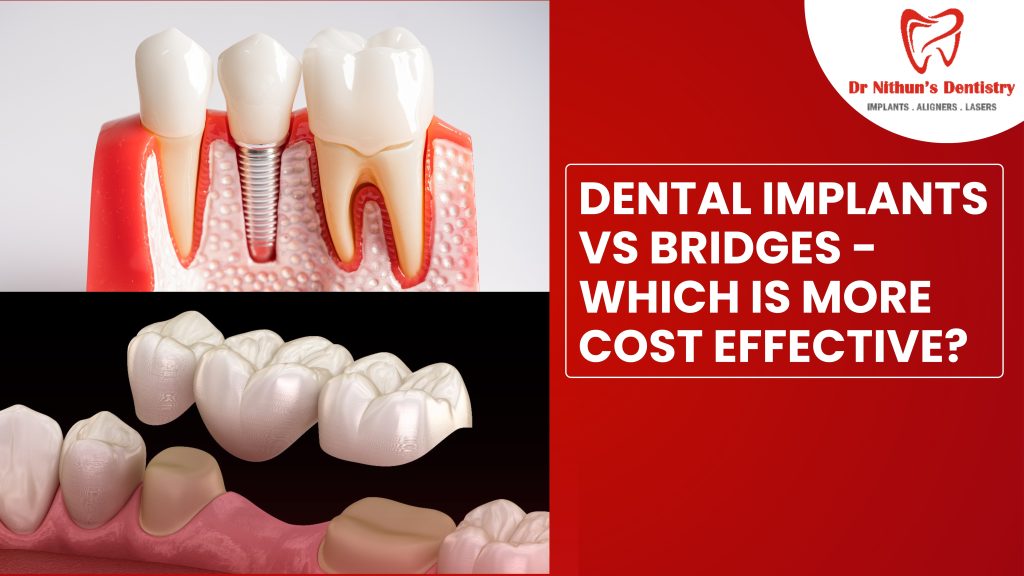Got a missing tooth and stuck between choosing a dental implant or a bridge? You’re not alone. This is one of the most common decisions people face at the dentist’s office—and unfortunately, it’s not always a straightforward one.
On the surface, a dental bridge seems quicker and cheaper. But dental implants have their loyal fanbase too, thanks to their durability and natural feel. So which one is actually more cost-effective in the long run?
Let’s break it all down: upfront costs, long-term maintenance, comfort, and what gives you the most bang for your buck.

First, What’s the Difference?
Dental Bridge
A dental bridge is a prosthetic tooth that’s held in place by crowns on the teeth next to the gap. Think of it like a tooth-sized “bridge” suspended between two natural teeth.
-
Requires the two adjacent teeth to be filed down
-
Typically takes 2–3 dental visits
-
Doesn’t involve surgery
Dental Implant
An implant is a titanium post surgically placed into your jawbone to replace the missing tooth root. A crown is later attached on top.
-
Preserves your jawbone
-
Doesn’t affect neighboring teeth
-
Requires minor oral surgery
Cost Comparison in India (2025)
| Treatment Type | Estimated Cost (INR) | Lifespan | Notes |
|---|---|---|---|
| Dental Bridge | ₹12,000 – ₹25,000 | 7–10 years | Involves 2 natural teeth |
| Dental Implant | ₹30,000 – ₹55,000 | 15–25 years+ | Preserves bone, stand-alone |
At first glance, bridges seem more budget-friendly. But implants pay off over time by lasting longer and requiring fewer replacements.
Longevity: How Long Will Each Option Last?
This is where implants really shine.
-
Bridges last about 7–10 years with proper care, but they often need replacing.
-
Implants, when well-maintained, can last 15–25 years or even a lifetime. The crown may need replacing after 10–15 years, but the implant base usually remains intact.
That means you could end up paying for a bridge twice (or more) over a 20-year period. Implants? Likely just once.
Aesthetic & Functional Differences
-
Implants feel and function like real teeth. They don’t slip, and they don’t rely on nearby teeth for support.
-
Bridges are stable but may not feel quite as natural, and they depend on reshaping healthy teeth—which weakens them in the long term.
For chewing, speaking, and daily comfort, implants are the closer match to a natural tooth.
What About Bone Health?
Here’s something most people overlook: bone loss.
When you lose a tooth, the bone underneath starts to shrink because it’s no longer stimulated by a root. Bridges do nothing to stop that.
Implants, on the other hand, mimic natural tooth roots and keep the jawbone healthy and intact. So if you care about your facial shape and long-term oral health, implants are a smarter choice.
Time & Procedure Differences
Dental Bridge:
-
No surgery needed
-
Done in 1–2 weeks
-
Temporary option available while waiting for final crown
Dental Implant:
-
Involves surgery (usually under local anaesthesia)
-
Takes 3–6 months for full healing
-
May require bone grafting in some cases
So yes, implants take longer. But for many, the permanence and comfort are worth the wait.
Maintenance & Hygiene
-
Bridges require special flossing tools to clean under the prosthetic tooth. If you don’t clean properly, you risk decay in the supporting teeth.
-
Implants are cleaned just like natural teeth—regular brushing and flossing do the job.
In short, implants are easier to maintain over time.
When Is a Bridge a Better Option?
Let’s be fair—bridges aren’t obsolete. They’re a better choice if:
-
You need a quick, non-surgical solution
-
The adjacent teeth already have large fillings or crowns
-
You’re on a tighter budget
-
You’re medically unfit for implant surgery
-
You prefer not to wait several months for healing
Still, be prepared for possible replacements and higher maintenance costs down the road.
Choose a dental bridge if:
-
You want a faster and more affordable fix
-
You’re not ready for surgery
-
You understand that it may need replacement in 7–10 years
Go for a dental implant if:
-
You’re looking for a long-term solution
-
You want to preserve bone and protect surrounding teeth
-
You’re okay with the timeline and slightly higher upfront cost
When you add up replacement costs, jawbone preservation, comfort, and ease of maintenance—dental implants come out as the more cost-effective option in the long run.
